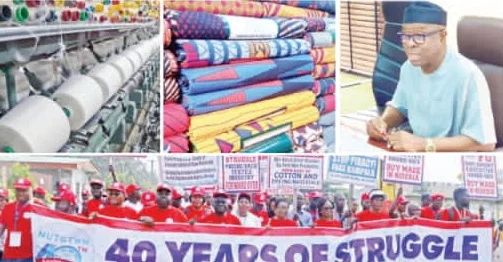The federal government’s effort towards revitalising the textile industry and the N100 billion intervention fund had seem not to be yielding the intended result on the industry.
There is no doubt that the country’s comatose textile sector has been a great concern to the government, stakeholders and Nigerians as a whole.
The Federal Ministry of Industry to address the challenges faced by the Nigerian textile sector and to reposition it as the major driver of job creation and generation revenue for the country. The federal government through Cotton Textile Garment Intervention Fund invested N100 billion to revive the Nigerian textile industry which has ended into a failure.
The Cotton Textile and Garment Fund, which the Bank of Industry manages at a very low interest rate was tasked with the job of reversing the progressive industry collapse and ensuring a rapid revitalisation and upgrading the entire Cotton Textile Garment (CTG) value-chain. As the textile industry was one of those areas government was looking at and want to remove the barriers to increase productivity in this important and strategic sector.
It has been revealed that the CTG Development Fund put in place by the government is yet to positively impact on the nation’s quest for self-sufficiency in textile and garment manufacturing.
There were 175 textile mills in the country by 1985 to less than 20 current textile industrial firms in 2022. Employment-wise, the number of jobs provided by the industry took a dive from 137,000 jobs in 1996 to 24,000 jobs in 2008. Today the number of jobs provided in the industry is less than 20,000 jobs.
This is said for an industrial sector that was adjudged the highest employer of labour in Nigeria after the federal government in the 1980s when it has a manpower of 50,000 workers under its employment.
Stakeholders called on the government to provide the enabling environment for the revival of the textile industry and the manufacturing sector.
President of Nigerian Textile Manufacturers Association (NTMA), Mr Folorunsho Daniyan, observed that in spite of the efforts to revive the textile industry, the sector is still confronted with many challenges that included high-cost production that has rendered its products non-competitive, unrestrained smuggling and counterfeiting of Made-in-Nigeria textiles, poor patronage in spite of Federal Government of Nigeria’s Executive Order 003 of 2017, inadequate and costly electricity supply, poor infrastructure, high taxation, and interest rates, high cost of diesel and LPFO and the depreciating value of the naira.
He also noted that the state of the industry particularly in the north is made worst by the heightened insecurity that is pushing away customers of the few existing industries in the north and also discouraging new investment in the area.
“We wish to emphasise that the government must do more to provide the enabling environment for the revival of the textile industry in Nigeria and manufacturing activities in general.
“We also frown at the Nigeria Customs Service for not effectively combating smuggling such that cheap smuggled textile products largely from China and other Asian countries continue to dominate the local market with little or no access to locally produced textiles,” Daniyan said.
He stated that the promised benefits of the African Continental Free Trade Agreement, (AFCFTA) will elude Nigeria if the illegal imports of textile fabrics and other products Nigeria have the capacity to produce locally continue to find their way in the Nigerian markets unchecked.
He noted that the NTMA, along with labour union acknowledged some measures by the Federal Ministry of Industry, Trade and Investment, the Central Bank of Nigeria (CBN), and the Bank of Industry (BoI) aimed at the textile industry revival.
The NTMA boss said the lack of patronage despite Executive Order 003 on the patronage of locally-produced goods also hindered the growth of the textile industry, calling on relevant government agencies to comply with the executive order by patronising locally-made textiles to avert further factory closures and job loss.
He mentioned that a fully revived textile industry would create millions of jobs and address insecurity, improve internally generated revenue, reduce billions of dollars in import bills incurred annually on textile and apparel, and ensure foreign exchange earnings.
Also, president, National Union of Textile Garment and Tailoring Workers of Nigeria (NUTGTWN), Mr John Adaji, said that effective implementation of the Executive Order 003 of 2017 would facilitate rapid recovery of the textile industry.
According to the Executive Order, all Ministries, Departments and Agencies (MDAs) of the federal government shall grant preference to local manufacturers of goods and service providers in their procurement of goods and services.
Adaji said the textile sector is a huge investment opportunity for the country if properly harnessed, thus called for the political will to resolve challenges confronting the industry.
The managing director of Lancelot Ventures Limited, Mr Adebayo Adeleke, said the intervention failed because the issues on raw materials and machineries was not considered before putting up the programme.
To ensure the revival of the textile sector, a number of issues should have been put in place, such as ensuring the machineries are producing effectively and efficiently to world standards and are able to make the companies compete constructively.
Meanwhile, the operators of the textile industry are hoping that more would come from the government to rescue the industry.





